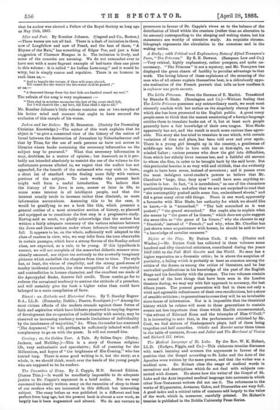Judcea and her Rulers. By M. Bramston. (Society for Promoting
Christian Knowledge.)—The author of this work explains that its object is "to give a connected view of the history of the nation of Israel between the destruction of Jerusalem by Nebuchadnezzar and that by Titus, for the use of such persons as have not access to libraries where books containing the necessary information on the subject may be procured." What that necessary information is may, doubtless, be a matter of opinion ; but inasmuch as it is pro- bably not intended absolutely to restrict the use of the volume to the unfortunate persons alluded to, we regret that the anther has not appended, for the benefit of the unlearned who may wish to learn, a short list of standard works dealing more frilly with various portions of the subject. To such works the present book might well form a useful introduction. We believe that the history of the Jews is sure, sooner or later in life, to rouse some interest in all intelligent people, and that the interest usually tends to increase rather than diminish, as more information accumulates. Assuming this to be the case, it would be gratifying to see a book like this, which presents a general outline of a most attractive section of history, so planned and equipped as to constitute the first step in a progressive study. Having said so much, we gladly acknowledge that the author has written a fairly adequate summary of the various relations between the Jews and those nations under whose influence they successively fell. It appears to be, on the whole, sufficiently well adapted to the class of readers in view, who, we may infer from the tone observable in certain passages, which have a strong flavour of the Sunday-school class, are expected, as a rule, to be young. If this hypothesis is correct, we will not complain of the somewhat didactic manner occa- sionally assumed, nor object too seriously to the avowedly imaginary pictures which embellish the chapters from time to time. The style has, at least, the virtue of simplicity, and the strong good-sense of sundry incidental remarks, the clear recognition of the complexity and contradiction in human character, and the excellent use made of the Apocryphal Books, deserve full credit. These merits go far to redeem the occasional tendency to assume the attitude of a preacher, and will certainly give the book a higher value than could have belonged to a mere compilation of facts.


































 Previous page
Previous page